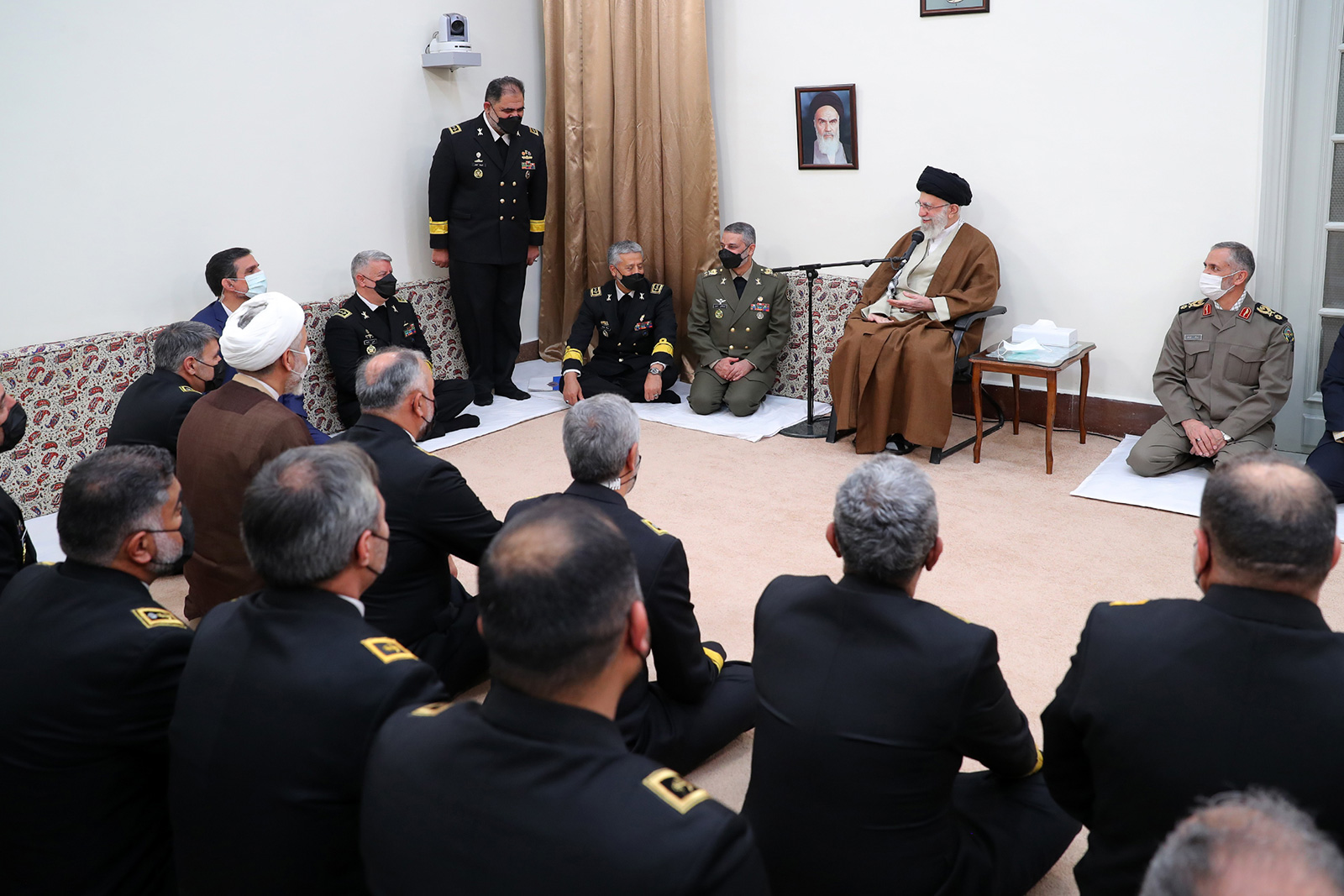The leader of the Islamic Revolution has called for Iran’s naval forces to expand their reach and capabilities in international waters and high seas.
"It is necessary to comprehensively improve the navy’s combat power and defense equipment while continuing measures such as sailing in distant and international waters," the commander-in-chief of Iran’s Armed Forces, Ayatollah Ali Khamenei, said in a meeting with a number of Iranian naval commanders on November 28 on the occasion of the country’s Navy Day, according to Khamenei.ir.
He added that “despite this history and our vast seacoasts in the north and especially the south of Iran, the culture of using the opportunities available at sea has been neglected and needs to become a part of the public culture of the country.”
Noting the importance of Makran's coastlines in the International North-South Transport Corridor, Khamenei said that “during the past few years, developing the Makran Beaches has been discussed, and governments have welcomed this idea”.
Iran has recently constructed significant nautical and commercial infrastructure in a number of Makran districts, particularly at Chabahar port, which serves as a vital trade route between the Indian Ocean and landlocked nations in Central Asia. Makran is a historical region in Iran that runs from mountains west of Jask all the way to parts of Pakistan's Balochistan province in the southeast along the Sea of Oman.
On November 27, Iranian President Ebrahim Raisi visited the second marine area of Bandar-e Jask in the southern province of Hormozgan to participate in the naval parade of the Iranian Army on the occasion of the Army Navy Day.
The units participating in the parade were the Ghadir and Fateh submarines, the helicopter squadron, the Sahand and Alborz destroyers, the Fajr and Sirik frigates, the Tonb cruiser, the Hormuz-class landing craft, and the Ghadir and Sirik frigates.
The president also visited the exhibition of the achievements of the Navy before going on the deck of the Sahand destroyer to review the parade of the subsurface, surface and flying units of the Army.
“Despite the threats that exist today in international waters and different parts of the oceans, the presence of the navy is reassuring for economic operators,” the president said during his visit, adding that “the expansion of economic activities and commercial development is possible with the presence of the naval forces of the Army.”
During a videoconference with the 85th, 86th and 87th naval groups of the army, their commanders, the commanders of the destroyer Bayendor and the combat support ship of Bandar Abbas in the waters of the Red Sea and the commanders of the Makran frigate and the Dena destroyer in the waters of the Pacific Ocean, the president appreciated the role of the navy stationed in these fleets in ensuring the security of the country.
In recent years, Persian Gulf waters have witnessed attacks on tankers that have come at times of heightened regional tensions with Iran. On November 22, the US Navy's Bahrain-based 5th Fleet published photos and details of its investigation into the attack on the Liberian-flagged Pacific Zircon tanker, including debris from the Shahed-136 drone itself.
In a statement, the Navy said the drone ripped a 30-inch-wide (76 cm) hole into the back of the ship. The explosive impact damaged a shipboard boiler, potable water tank and life raft.
"The Iranian attack on a commercial tanker transiting international waters was deliberate, flagrant and dangerous, endangering the lives of the ship's crew and destabilizing maritime security in the Middle East," Vice Adm. Brad Cooper, the top US Navy commander in the Middle East, said in a statement.
However, Iranian Foreign Ministry Spokesman Nasser Kanaani November 28 called accusations made by the United States suggesting Iran was behind an attack on a tanker in the Gulf of Oman "baseless".
Earlier, in July 2021, a suspected drone attack hit a petroleum product tanker managed by an Israeli firm off Oman's coast. Iran denied any involvement in the incident.







 Russian peacekeeping forces, deployed in the Karabakh (Garabagh) region of Azerbaijan since 2020, have commenced their withdrawal from the area.
Russian peacekeeping forces, deployed in the Karabakh (Garabagh) region of Azerbaijan since 2020, have commenced their withdrawal from the area.
 Iran's senior military leaders described the drone and missile attack on Israel on April 14 night as “successful".
Iran's senior military leaders described the drone and missile attack on Israel on April 14 night as “successful".
 The number of evacuees from flooded areas in Kazakhstan has reached 97,852 people, including about 32,856 children since March 27.
The number of evacuees from flooded areas in Kazakhstan has reached 97,852 people, including about 32,856 children since March 27.
 Azerbaijan officially unveiled the logo for the upcoming 29th session of the Conference of the Parties to the United Nations Framework Convention o...
Azerbaijan officially unveiled the logo for the upcoming 29th session of the Conference of the Parties to the United Nations Framework Convention o...
 The Kazakh authorities have increased their arbitration claims against international oil companies involved in the development of the Kashagan oil ...
The Kazakh authorities have increased their arbitration claims against international oil companies involved in the development of the Kashagan oil ...



